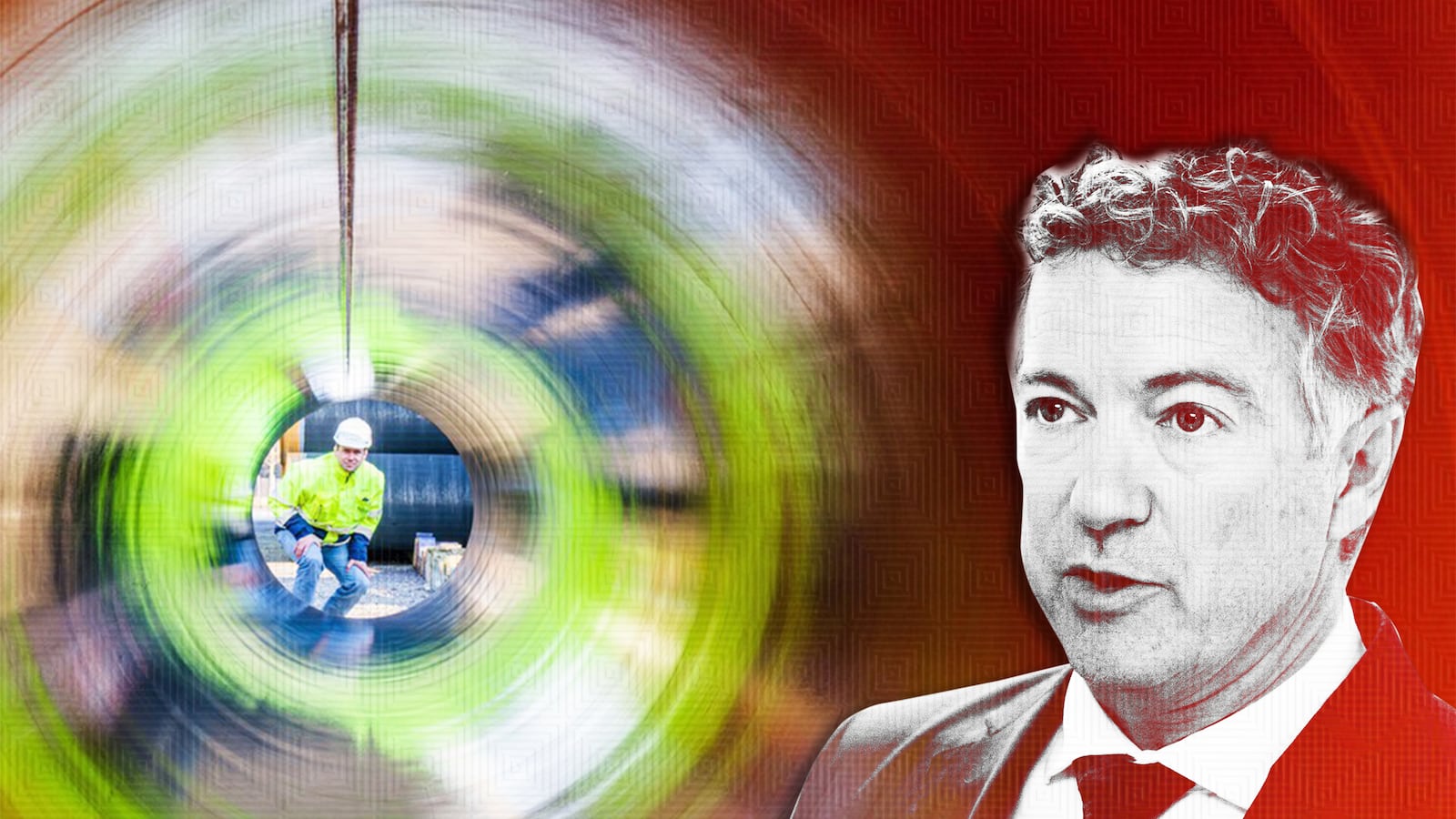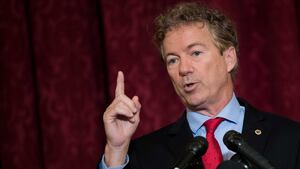Advocates for a massive Russian natural gas pipeline project have a powerful, quiet ally in Congress: Sen. Rand Paul, a Kentucky Republican and close friend of President Donald Trump. He has quietly worked against sanctions on the Nord Stream 2 project, which would dramatically expand Russia’s shipments of natural gas to Germany. Critics say it would also dramatically expand Russia’s influence in Western Europe while harming Ukraine. The Trump administration has weighed sanctioning the project, but has yet to do so. And Trump himself has criticized it.
On Thursday, the senator postponed the Senate Foreign Relations Committee’s mark-up of legislation that would have put sanctions on the project, according to multiple sources with knowledge of the committee’s proceedings. And while Paul hasn’t publicized his opposition to the proposed sanctions, he sent Senate colleagues a letter before the mark-up explaining his stance. The letter, which The Daily Beast obtained, argues that the legislation in question—a bipartisan bill introduced by Sens. Ted Cruz and Jeanne Shaheen—doesn’t clearly state which entities would be sanctioned.
“This means that, ultimately, we are voting blind as to who will be sanctioned under this bill,” Paul wrote in the letter. “Congress would once again pass on our authority to the Executive Branch, thus abandoning our constitutional responsibility to make laws.”
He echoed that reasoning in comments to The Daily Beast. “Congress has not only become trigger happy, but sanction happy. If this legislation goes into force, we would be sanctioning European allies,” Paul said.
Though the letter criticizes the legislation for being vague about the sanctions’ targets, it also says the sanctions would directly impact two specific companies—one Italian, and the other Swiss.
“These sanctions would not be felt by the Russians, but by companies from Austria, Germany, the Netherlands, France, Finland, Sweden, and Italy, as well as their investors,” Paul wrote.
Paul isn’t alone in that view. Last year, Agnia Grigas of the Atlantic Council told Foreign Policy that sanctions on the project could drive a wedge between the U.S. and Western European allies.
“I strongly urge you to oppose this legislation,” Paul concluded in his letter.
Paul is working with aide Jim Webb, who joined his office last year, to gin up opposition to the project, according to a Senate source with knowledge of the office’s strategy. Richard Burt, the Washington lobbyist leading the effort to protect the pipeline, has a longstanding relationship with Paul, and Politico called him one of the senator’s “main foreign policy advisor[s]” in 2014. Burt also advised Trump during the 2016 campaign on a major, Russia-friendly foreign policy address.
Russia’s state-controlled natural gas export monopoly, Gazprom, is building the near-completed Nord Stream 2 pipeline. Its completion would let Russia double its natural gas shipments to Germany. Shortly before Trump’s friendly press conference with Russian President Vladimir Putin in July 2017, he ripped German Chancellor Angela Merkel for embracing the project. Noting that Germany is a member of the NATO alliance, created to stave off Russian aggression, Trump said, “We have to talk about the billions and billions of dollars that’s being paid to the country we’re supposed to be protecting you against.”
Paul has long criticized interventionist foreign policy, and was one of just two senators to vote against the 2017 Countering America’s Adversaries Through Sanctions Act (CAATSA), which sanctioned Russia, Iran, and North Korea. Its only other Senate opponent was Sen. Bernie Sanders.
An aide to a senator who publicly opposes the Nord Stream 2 project said Paul’s letter contains errors.
“The letter is very shouty and very wrong,” said the aide, who was not authorized to speak on the record. “It misspells a bunch of things repeatedly, including Nord Stream. It says the bill is economic warfare but it’s against two companies. It says no one knows who’s getting targeted, then it complains about targeting those two companies. It says Europe supports Nord Stream, but everyone except Germany opposes it.”
The legislation in question would sanction ships involved in building the pipeline. Russian state media says construction of the pipeline is nearly complete.
“This pipeline has the tremendous potential to compromise energy security throughout the continent for decades,” said Shaheen, a Democrat, when she introduced the bill.
Russia’s influence in the U.S. and the West has come into sharp relief over the past several years, since the Kremlin interfered in the American 2016 presidential campaign and the Brexit vote in the U.K. In testimony before the House Intelligence Committee last week, former Special Counsel Robert Mueller said the Kremlin is currently working to meddle in the 2020 campaign season.
And much of the conversation about Russia’s 2016 interference focuses on sanctions. During the Obama administration, the United States sanctioned numerous Russian officials for the death of lawyer Sergei Magnitsky. Those sanctions enraged the Kremlin, which dispatched envoys to lobby Washington to have them lifted. Those sanctions were the topic of the now-notorious June 2016 Trump Tower meeting between Trump’s campaign chief Paul Manafort, son Donald Trump Jr., son-in-law Jared Kushner, and a Kremlin-linked lawyer.
Since Trump’s election, the U.S. has leveled more sanctions against the Kremlin—sometimes haphazardly. When the Treasury Department sanctioned the Russian aluminum conglomerate Rusal and its parent company En+ Group, global aluminum markets veered into chaos. Treasury then made a deal with the company to reduce oligarch Oleg Deripaska’s control over it, and lifted the sanctions. But the decision to roll them back drew vocal opposition on the Hill, and 42 senators voted to keep them in place. Several months after that effort failed and the sanctions were lifted, news broke that Rusal would make a major investment in an aluminum plant in eastern Kentucky—the home state of Senate Majority Leader Mitch McConnell and of Sen. Paul.







